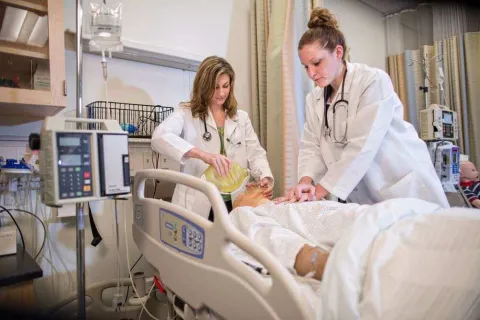Autonomy in Nursing: Exploring The Nurse Practitioner Pathway

Originally published on March 10, 2022 and refreshed on May 10, 2023.
Autonomy in nursing is crucial to nurse practitioners (NPs) because it allows them to practice independently and make clinical decisions based on their own professional judgment and expertise. Given the autonomy to make their own decisions, nurse practitioners can influence patient outcomes and promote well-being.
The NP pathway is a nursing career path that affords nurses autonomy in their practice, fair compensation, high job satisfaction and more professional opportunities compared to other nursing roles. Explore how the NP role expands upon the skills, knowledge and practice authority of a registered nurse and how to become an NP.
What Is Autonomy In Nursing?
Autonomy in nursing refers to a nurse’s ability to make judgments and decisions about patient care and practice setting. Some common ways nurses display autonomy on the job include:
- Determining when to administer pain medication
- Adjusting patient positioning to offer greater comfort, better breathing capacity, etc.
- Seeking out or requesting specialist input in response to clinical assessments and evaluations (e.g., poor mobility)
Nurses gain additional autonomy when they become NPs. They have graduate-level preparation to take on additional responsibilities, including the diagnostic reasoning necessary to formulate medical diagnoses and the advanced coursework necessary for determining treatment plans, including the prescription of medications.
Benefits of Autonomy in Nursing For NPs
Nurse job satisfaction has been correlated with nurse autonomy. Having the opportunity to be an independent thinker and caregiver is a key part of greater job satisfaction.
The expanded autonomy NPs experience, compared to RNs, leads to career satisfaction. While this metric is not a direct indication of patient outcomes or financial savings/gains, it is still an important metric for the welfare of our health care system. Because health care professionals are in short supply across specialties and positions, maximizing job satisfaction is crucial to stemming any loss of ground in the race to close the talent gap. Satisfied NPs are much less likely to experience burnout or quit the nursing profession.
Furthermore, greater autonomy in the nurse practitioner role benefits the health care system. Increased NP autonomy makes the job more appealing to aspiring nurses, which builds the pipeline of advanced practice nurses. This is especially important in primary care settings, which are projected to see a shortfall of nearly 50,000 physicians compared to demand by 2034.
Benefits of Autonomy in Nursing for Patients
Autonomy in nursing is also beneficial for patients. When NPs have the autonomy to provide treatment to patients, they increase the opportunity to enhance patient satisfaction. Multiple studies have found that patients of NPs experience shorter hospital stays.
In an open letter to the American Medical Association, the American Association of Nurse Practitioners (AANP) argued that 56% of patients report that NPs spend more time listening to them and addressing their concerns than other providers. The AANP research also found that patients who receive NP care experience additional benefits compared to patients who do not receive care from NPs, including:
- Fewer avoidable emergency room visits
- Higher patient satisfaction rates
- Lower medication costs
- Lower malpractice rates
Autonomy in Nursing Examples
Autonomy in nursing refers to the ability of nurses to make independent decisions in their practice. Here are some examples of autonomy in nursing:
- Patient assessments: Nurses can exercise autonomy in conducting patient assessments, which includes taking a patient’s medical history and performing physical examinations.
- Care plans: Nurses are also autonomous in developing care plans for their patients, including setting health goals, establishing medical interventions and evaluating patient health outcomes.
- Medication management: Nurses can exercise autonomy in administering medications to their patients, including determining the appropriate dosage and route of administration. Note that this can depend on the practice authority in that each state.
- Patient education: Nurses are autonomous in delivering medical education to their patients, including teaching patients about medications, treatments and medical conditions.
- Advocacy: Nurses are autonomous in advocating for their patients, including ensuring that their patients receive appropriate care, advocating for their patients’ rights and communicating their patients’ needs to other members of a health care team.
When nurses are empowered to exercise their autonomy, they can promote the best possible outcomes for their patients.

The Nurse Practitioner Pathway
Nurses who seek greater autonomy in nursing may find the nurse practitioner pathway is a good fit. The path begins with a bachelor’s degree in nursing and a registered nursing license. Next, NP candidates must earn a Master of Science in Nursing or a Doctor of Nursing Practice through a graduate clinical nursing program.
The Nurse Practitioner Role
The NP role is an advanced practice role. NPs are prepared to do many of the same things physicians can do, including:
- Conducting physical exams
- Making medical diagnoses
- Ordering labs and tests
- Interpreting test results
- Prescribing medication
- Constructing treatment plans
- Helping patients manage illness
- Referring patients to specialists and managing transfers of care
Local practice authority laws determine whether NPs may conduct these activities and whether they can perform them autonomously or under the supervision of a physician.
Nurse Practitioner Care Settings
NPs can treat patients and work in a variety of care settings based on their population focus, including:
- Hospitals
- Inpatient/Outpatient facilities
- Physicians’ offices
- Critical care settings (emergency departments, urgent care facilities)
- Surgical settings
- Intensive care units
A Psychiatric-Mental Health Nurse Practitioner (PMHNP) is a type of advanced practice registered nurse (APRN) who specializes in providing mental health care services. PMHNPs are trained to diagnose and treat mental health conditions, prescribe medications and provide psychotherapy to individuals, families and groups.
Psychiatric nurse practitioners work in a variety of settings, including:
- Behavioral health clinics
- Psychiatric mental health facilities
- Community mental health clinics
- Hospitals
- Correctional facilities
PMHNPs often work in collaboration with other health care providers, such as psychiatrists, psychologists, social workers and primary care providers, to ensure comprehensive care for their patients.
Nurse Practitioner Specializations
Specializing in nursing is a great way to work with specific patient populations such as infants, older adults and patients with psychiatric health challenges. The specialties NPs can choose from are:
- Family nurse practitioner (FNP)
- Psychiatric-Mental Health Nurse Practitioner (PMHNP)
- Adult-gerontology acute care nurse practitioner (AGACNP)
- Adult-gerontology primary care nurse practitioner (AGPCNP)
- Neonatal nurse practitioner (NNP)
- Primary care pediatric nurse practitioner (PNP-PC)
- Acute care pediatric nurse practitioner (PNP-AC)
- Women’s health nurse practitioner (WHNP)
Nurse Practitioner Pathway: Job Outlook
In addition to the increased nursing autonomy, the job outlook for NPs is strong, making it a wise professional goal for nurses who wish to advance their career. Between 2021 and 2031, the Bureau of Labor Statistics (BLS) projects that positions for nurse anesthetists, nurse midwives and nurse practitioners will grow by more than 40%, which is much faster than the average for all occupations. Depending on their specialization, NPs may find that this growth varies, as primary care physicians, for example, are in extremely high demand, making family nurse practitioners (FNPs) particularly sought-after.
Nurse Practitioner Salary
The median annual wage for nurse anesthetists, nurse midwives and nurse practitioners was $123,780 in May 2021, according to the BLS. Wages in outpatient care centers and hospitals outpaced that of NPs in physicians’ offices and educational services.
Nurse Practitioner Pathways: MSN vs. DNP Routes
Registered nurses who aspire to become nurse practitioners have options as to which graduate degree they obtain on their nurse practitioner pathway.
A master of science in nursing degree (MSN) is an ideal degree for working nurses who want to continue working in a clinical setting and prefer the shortest timeline to completion.
Some nurses may have already earned a master’s degree with a nonclinical focus, such as administration. These aspiring NPs may find that building upon their master’s degree with a post-graduate certificate is a better nurse practitioner pathway. Nurses who aspire to reach the highest level of education may also consider a DNP because it is a terminal degree and opens doorways to work in academia, policymaking, leadership, management and research.
Start Your Nursing Career at Marymount University
The entry-level option for students with non-nursing undergraduate degrees is the Online ABSN. In just 16 months, Online ABSN students complete the following requirements in preparation for RN careers:
- An on-campus residency
- Clinical placements in Virginia
- 100% online courses on topics like Research and Evidence-Based Practice
Marymount’s ABSN is accredited by the Commission on Collegiate Nursing Education (CCNE). Nursing courses at Marymount are taught by practicing APRNs who can speak with authority about the profession. The university’s stellar reputation is confirmed by top U.S. News & World Report rankings in its National Universities and Nursing categories.
If you want to become an RN, contact one of our student advisors to discuss if this program is right for you.
